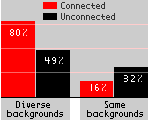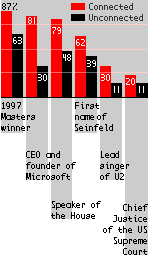Diversity Works
Are organizations more productive with a workforce that shares the same background or one that has diverse backgrounds?

Turned
On, Not Tuned Out
Percentage
of respondents who could correctly identify each of these public figures.

.
. . .
See
the full survey results
.
. . .
[an error occurred while processing this directive]
Change is good
It makes sense that Digital Citizens view their political system with affection. They are poised to lead it and prosper from it. They stand out from the rest of the population in their positive attitudes about the future and their eagerness to embrace change. They feel optimistic and in control. They are the most future-oriented people in the country.Americans are bitterly divided about whether technology is good or bad, whether it elevates our lives or corrodes our values. Many intellectual and journalistic leaders see technology as a dangerous, out-of-control force that has an immoral impact on society. Digital Citizens have a different response, viewing technology with caution, but rarely with fear. They understand quite well - better, surely, than anybody - that technology has limits, and that it can bring unforeseen consequences in addition to its many benefits. Although only 24 percent of Unconnected Americans subscribe to the belief that technological breakthroughs will leave them with less free time in the future, for example, the Connected are even more skeptical - 37 percent are convinced that new technology translates into less free time.
For the Connected, technology is seen not as a cure-all, but as a powerful tool for individual expression, democratization, economic opportunity, community, and education. Their familiarity with technology has helped create what may be the most confident and optimistic segment of our political culture. For Digital Citizens, as for the world beyond, stasis is simply not an imaginable option.
Change is inevitable, and Connected Americans view it as a force that they can master. Among the Connected, almost seven in ten feel they control change, while only 19 percent think change controls them. In the US population as a whole, just 52 percent say they control change; a third say it controls them. The statistics are even more bleak among the Unconnected, with 40 percent saying they control change and another 40 percent believing that it controls them.
In recent years, pollsters and politicians have reacted with increasing alarm to what they call "the loss of intergenerational optimism and hope." But the Connected segment of the American population suffers no such malaise. By more than two to one - 66 percent to 24 percent - Connected Americans believe their children and the next generation of Americans will enjoy a better quality of life than they have. In comparison, a much slimmer majority of the Unconnected - 53 percent - think their children's quality of life will surpass their own, while 37 percent of them believe it will not.
The technological chasm
that divides those who feel in control of a rapidly changing world and
those who feel at its mercy is one of the most politically and economically
significant findings of the Digital Citizen survey. For years our political
culture has pandered almost exclusively to the latter group - a constituency
that is more fearful than curious, more anxious to halt change than embrace
it. This pandering, the survey suggests, is a profound mistake. Connected
Americans are not only comfortable with change - they relish it. And if
technology is indeed transforming the world, its economies, and its politics,
they are more eager than anyone to join the process. ![[next]](twoarrow_red.gif)
. . . .
Discuss the survey
with Jon Katz and other digital citizens, in Threads.
. . . .
Feedback | Help | About Us | Jobs | Advertise | Privacy Statement | Terms of Service
Copyright © 1994-2000 Wired Digital Inc., a Lycos Network site. All rights reserved.